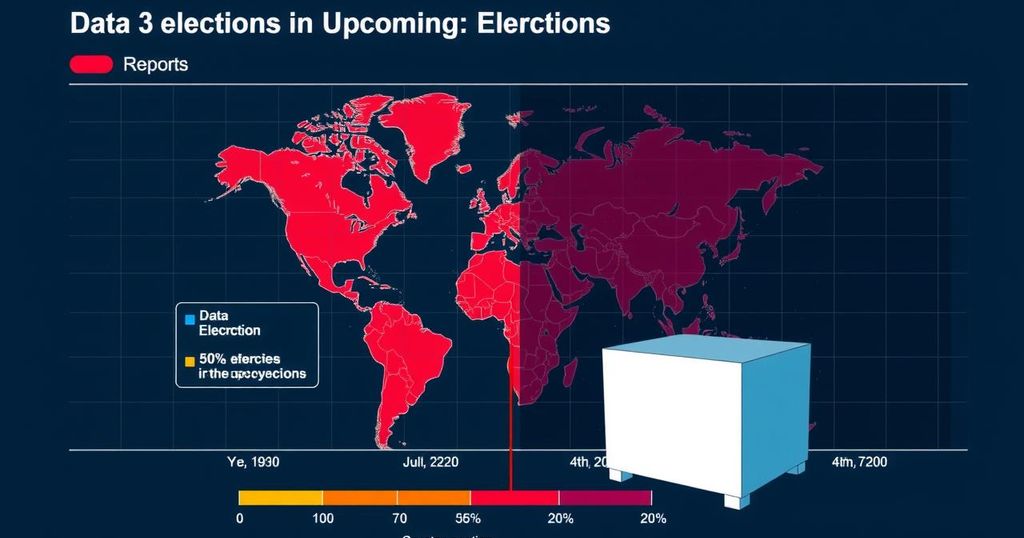The year 2024 was marked by extraordinary voter participation in global elections, with nearly 3 billion citizens voting across 73 countries. Despite a historic turnout, significant challenges such as disinformation and political polarization plagued democratic systems. The election cycle saw the rise of far-right movements, while younger leaders emerged in Africa, symbolizing potential shifts in governance. However, concerns about electoral integrity and representation persisted, underscoring mixed outcomes in the global democratic landscape.
The year 2024 represented a remarkable turning point in democratic participation as nearly 3 billion individuals voted across 73 nations, marking it as the most significant election year to date. These elections, encompassing both local and national levels, played a crucial role in shaping the political, social, and economic landscapes globally. For numerous participants, this election season offered their inaugural encounter with democracy, highlighting the inclusive potential of such systems. However, various challenges persisted, with a notable two-thirds of voters expressing feelings of disconnection from decision-making processes. Trust in democratic institutions was further compromised by disinformation, political polarization, and the misuse of state resources by incumbents intent on preserving their hold on power. The impact of social media and artificial intelligence contributed to these issues, introducing problems such as misinformation and concerns regarding electoral integrity.
Dubbed the “super election year,” 2024 was characterized by significant political upheaval as incumbents, perceived as out of touch, were frequently voted out of office. Notably, far-right movements gained momentum in France and Germany, capitalizing on economic and cultural discontent. Yet, centrist coalitions demonstrated effectiveness in mitigating their rise to power. Despite the emergence of election irregularities, such as vote-buying in Serbia and voter suppression tactics in the United Kingdom, there were also signs of democratic resilience. In several African nations, younger leaders began to ascend the political ladder, indicating a potential shift towards more inclusive governance.
The elections illuminated a dual narrative of progress and vulnerability within modern democracies, where critical issues such as misinformation and polarization continued to challenge democratic tenets. On issues of gender representation, encouraging progress was noted, particularly in Mongolia, which saw a seven-percentage-point increase in women’s parliamentary presence due to the introduction of gender quotas. However, setbacks in countries such as Bhutan and Belarus illustrated ongoing hurdles for women’s political empowerment. Youth representation also remained low, with leaders often significantly older than their constituents. However, there was a marginal trend towards younger leaders, primarily in Africa, though structural barriers persisted.
Significant challenges confronting democracy included electoral integrity concerns, the erosion of trust in institutions due to misinformation campaigns, and the adverse effects of social media. Oppressive measures and political polarization limited civic engagement, while economic challenges fostered a wave of anti-incumbent sentiment. The growing influence of far-right movements, juxtaposed with the resistance from centrist coalitions, highlighted the complex dynamics shaping global governance.
The 2024 elections underscored the enduring strengths and vulnerabilities inherent in democratic processes. While systemic inequities and patronage politics continue to undermine electoral integrity, the democratic engagement witnessed in 2024 offers an avenue for rejuvenation. This year constitutes both a challenge and an opportunity for fostering democratic reform, achieving inclusivity, and ensuring broader representation within active political structures.
The 2024 election year was a historic moment for democracy worldwide, characterized by an unprecedented number of voters participating in elections across 73 countries. This phenomenon reflects a growing global trend toward increased political engagement and the broader implications of democratic systems. However, despite this engagement, numerous challenges undermined public trust and the integrity of democratic processes. Factors such as disinformation, political polarization, and systemic barriers to representation contributed to a complex political landscape that called for innovative reform and greater inclusivity in governance.
In conclusion, the “super election year” of 2024 highlighted both the strengths and challenges facing global democracy. With close to 3 billion individuals voting, this year showcased the critical role of democratic participation in shaping societal outcomes. However, persistent issues such as election irregularities, decreasing trust in institutions, and underrepresentation of women and youth indicate necessary areas for reform. The experiences gleaned from these elections could inform future approaches to strengthening democratic engagement and governance, inspiring a renewed commitment to inclusive political processes.
Original Source: anfrel.org







